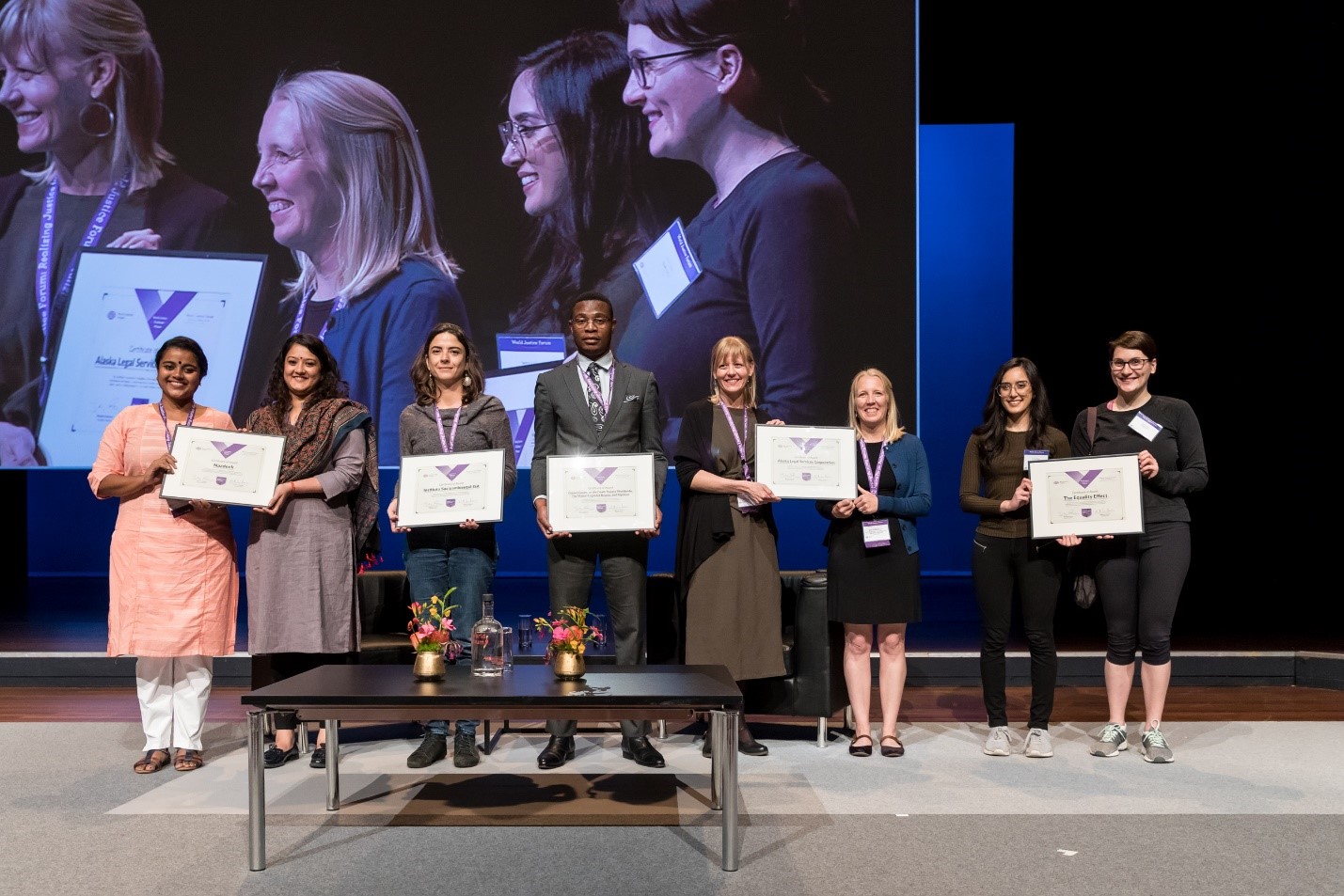
THE HAGUE, NETHERLANDS – On Thursday, May 2, 2019 at the World Justice Forum in The Hague, Netherlands, the World Justice Project announced five project winners in a worldwide competition to identify and highlight effective and promising work to increase access to justice. As revealed at the World Justice Forum launch of the Task Force on Justice's "Justice for All" report, more than 5 billion people have unmet justice needs globally. This justice gap includes people who cannot obtain justice for everyday problems, people who are excluded from the opportunity the law provides, and people who live in extreme conditions of injustice.
The 2019 World Justice Challenge: Access to Justice Solutions competition sought to identify projects working to provide access to justice to these excluded groups, and contribute to the movement to close the justice gap and realize justice for all. Thirty World Justice Challenge finalists were invited to present their projects at the World Justice Forum in The Hague, and five $10,000 USD prize-winners were announced at the Forum’s closing plenary session on May 2.
Congratulations to the 2019 World Justice Challenge: Access to Justice Solutions winners:
- 160 Girls Access to Justice Project, The Equality Effect, Kenya
Nearly two-thirds of Kenyan girls experience sexual assault. In 2013 the Kenyan High Court found that police failure to enforce existing rape law had created a climate of impunity. This project is working to change this culture through police trainings, education, and creative legal advocacy projects.
- Partnering for Native Health, Alaska Legal Services Corporation, United States
Indigenous populations throughout the United States experience some of the greatest health inequalities. This project is the first US collaboration delivering health-impacting civil legal assistance to a target population of economically vulnerable indigenous individuals, specifically targeting remote and rural areas. PNH addresses indigenous peoples social determinants of health by using legal empowerment and education as a tool to improve the health and safety of tribal members, and establishing culturally appropriate locally based networks of civil legal attorneys embedded in the tribal health care delivery system.
- Malawi Resentencing Project; Cornell Centre on the Death Penalty Worldwide, The Malawi Legal Aid Bureau, and Reprieve; Malawi
In 2007, the Malawi High Court struck down the mandatory death penalty on the grounds that it violated the accused’s constitutional rights to a fair trial and access to justice. This project was established in 2014 by a coalition of stakeholders to secure and support new sentence hearings that adhered to international fair trial standards.
- Riverine People & the Right to Full Reparation, Instituto Socioambiental - ISA, Brazil
In 2015, 300 families who lived on the islands and banks of the Xingu River, state of Pará, Brazil, were forcibly displaced from their homes to make way for the reservoir of Belo Monte hydroelectric power plant. This project, through strategic advocacy and a broad negotiation with the Brazilian government and the corporation, was able to influence the elaboration and implementation of an adequate reparation policy for traditional populations impacted by large infrastructure projects.
- Monitoring Maternal Health Entitlements & Increasing Access to Grievance Redressal, Nazdeek, India
The State of Assam experiences the highest maternal mortality rate in India. Health concerns are compounded on tea plantations where workers face substandard working conditions that negatively impact their health. This project developed grievance forums to identify and monitor rights violations, provide a mechanism for communities and the legal/administrative systems to discuss issues and concerns, and ultimately assist women in seeking redressal for their maternal and child health problems.

(Photo: Richard Theemling for World Justice Project)
The World Justice Project received a wide range of applications highlighting projects tackling the justice gap from nongovernmental, governmental, and civil society organizations. The five winning World Justice Challenge projects—selected out of 30 finalists and over 250 submissions—represent some of the best work being done globally to increase access to justice.
“The World Justice Challenge competition was one of the most engaging and inspiring parts of the Forum,” said James R. Silkenat, WJP Board of Directors member and 2019 World Justice Challenge judge. “We invited organizations and institutions throughout the world to highlight effective projects aimed at increasing access to justice. The response to our call was very impressive.”
Challenge applications were judged on impact, sustainability, replicability, scalability, and promise for the future. Thirty finalists were invited to travel to the 2019 World Justice Forum in The Hague, Netherlands where they presented their projects and were featured in the Forum expo to share their good practices and successful solutions to improve access to justice. Forum participants voted for their favorite projects via the World Justice Forum event app during the week of the conference. Winners were selected through a combination of participant votes and an expert selection committee. Each winning project received a $10,000 USD prize in recognition of its achievement and impact.
Watch the award ceremony here, and learn more about the World Justice Challenge, including winners, finalists, and honorable mentions here.
The 2019 World Justice Challenge competition was made possible through sponsorship by the WJP's League of Law Firms.
ABOUT THE WORLD JUSTICE PROJECT:
The World Justice Project (WJP) is an independent, multidisciplinary organization working to advance the rule of law worldwide. Effective rule of law reduces corruption, combats poverty and disease, and protects people from injustices large and small. It is the foundation for communities of justice, opportunity, and peace—underpinning development, accountable government, and respect for fundamental rights. Learn more at: www.worldjusticeproject.org.
MEDIA CONTACT:
[email protected]
(206) 792-7676






